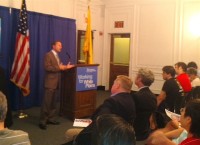Astorino Talks Tough in White Plains

Frustrated by an ongoing debate aired mostly in the media between his office and the Westchester County Board of Legislators, County Executive Rob Astorino has gone on the road to take his message directly to constituents. On Wednesday evening Astorino was introduced by Mayor Tom Roach to a full house at White Plains City Hall.
Promoting his three P’s for effective governance – “protect taxpayers, preserve essential services, and promote economic growth,” Astorino jumped into a discussion about the madness of unfunded state mandates. “What is essential and what is not?” Astorino asked. Acknowledging the pressure on social services, he continued, “I don’t want people in the county to go hungry, but some things do have to change. Revenues are flattening and expenses continue to go up. Eighty-two percent of county taxes are eaten up by state mandates.”
With Medicaid and pensions taking up the lion’s share of mandated expenses, Astorino blasted Albany for doing nothing about a worsening situation. “Westchester has a AAA credit rating, but for the first time we have been put on a negative watch list, he explained. “This is a mathematical problem and the system is collapsing. It cannot sustain itself” With regard to the high cost of pensions, Astorino cited the growing number of cities filing for bankruptcy in the United States. “When this happens the control boards come in and break the contracts,” Astorino warned.
Turning his attention to the settlement former County Executive Andy Spano entered into with the U.S. Department of Housing and Urban Development in which Westchester was accused of exclusionary zoning practices, Astorino said the county was ahead of schedule to meet key settlement terms. These include the investment of $51.6 million by the county to construct 750 units of affordable housing in 31 eligible communities identified by HUD over the course of seven years. So far, 130 units have building permits and 207 have financing. By the end of 2012, 125 building permits and the financing of 200 units are required by the settlement.
Because of its affordable housing program that includes mixed income housing marketed to diverse households, White Plains is not among the 31 communities named in the HUD lawsuit. However, Astorino warned White Plains residents in the audience that because HUD had decided to make demands outside the terms of the agreement the county was still in court. “HUD has basically said that zoning (heights, density, acreage) is exclusionary and wants to turn the voluntary Section 8 voucher program into a federal mandate,” he explained. “That means a 10-story multi-family affordable housing complex could be built right in the Gedney neighborhood. The feds want the county to sue local communities and because it has not done so, is withholding $12 million for homeless prevention programs, foreclosure counseling, neighborhood rehabilitation, and youth and senior programs.”
In separate interviews with The White Plains Examiner, County Legislator for District 5, Bill Ryan and Mayor Roach indicated they thought Astorino’s comments that White Plains might be forced by HUD to randomly build affordable housing units in any neighborhood were highly exaggerated. “We’re talking 750 affordable units in the whole of Westchester County. That’s a drop in the bucket,” said Ryan.
“White Plains is not involved in the litigation because we do not have barriers to affordable housing. We offer housing to people of every economic level,” explained Roach.
During the question and answer period after Astorino’s presentation, residents raised concerns about neighborhood problems, some under the county’s jurisdiction and a few being handled by White Plains. Cut backs on Bee-Line bus service, delays in the reopening of county pools, threats to educational programming at county parks and beach conditions at Rye Playland were met with the same answer. “This is what I mean when I ask ‘What is an essential service?’” Astorino said. “We have studied the bus routes to determine where there are more riders. Those statistics can be viewed by the public.”
Astorino maintained that Playland is not an essential service and that he does not think the county should be running an amusement park. “We are looking to work with the private sector at Playland,” he said.

